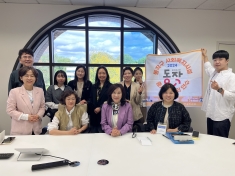Rutgers School of Social Work Hosts International Social Work Leaders for Lecture on Data Science, Machine Learning, and AI

On Wednesday, October 2, Rutgers School of Social Work had the privilege of hosting 10 social work leaders from South Korea who work in community social service agencies, including day care centers and facilities serving individuals with disabilities, older adults, and various populations in need such as children, youth, the elderly, and the deaf. Part of a larger trip to visit social work agencies and policymakers in the United States, the group requested to meet with the School of Social Work to gain insights from academic research.
Serving as a representative for the School, Assistant Professor Woojin Jung gave a lecture to the group on leveraging data science, artificial intelligence (AI), and machine learning (ML) approaches to better assess the needs of their communities. Specifically, Dr. Jung discussed how these technologies can help identify pockets of poverty and spatial disparities within communities. Together, the group explored the complexities of different agencies’ eligibility criteria, noting that some are based on national standards (e.g., disability, income) and accessible to any citizens, while others are restricted to serve local residents within specific communities.
“The social welfare system in South Korea is extremely well-digitalized, assessing eligibility criteria with no or minimal effort,” said Dr. Jung. “Still, poverty as the most basic need-based criterion remains a challenge to address in a small geographic unit. Reaching vulnerable populations—such as the homeless, children, or elderly who are less aware or physically unable to seek services—remains difficult. So there are on-going discussions on how the country as a whole can preemptively respond to their needs and reduce welfare blind spots, and I’m advising on this issue for the Korean Social Security Information Services. I introduced new data sources that could assist in these areas, such as spatial indicators of poverty (e.g., lack of greenery, unstructured housing), social media data reflecting salient issues of the time and place, and crowd-sourced maps showing proximity to basic services. The social work leaders were intrigued by how methods typically applied in developing countries such as the Republic of the Congo or Zambia could be adapted for use in Korea.”
“In turn, I learned valuable insights about the specific service needs in Korean communities from these social work leaders and managers,” Dr. Jung continued. “As a follow-up to the visit, they have expressed interest in scheduling a Zoom lecture to continue our discussions.”



